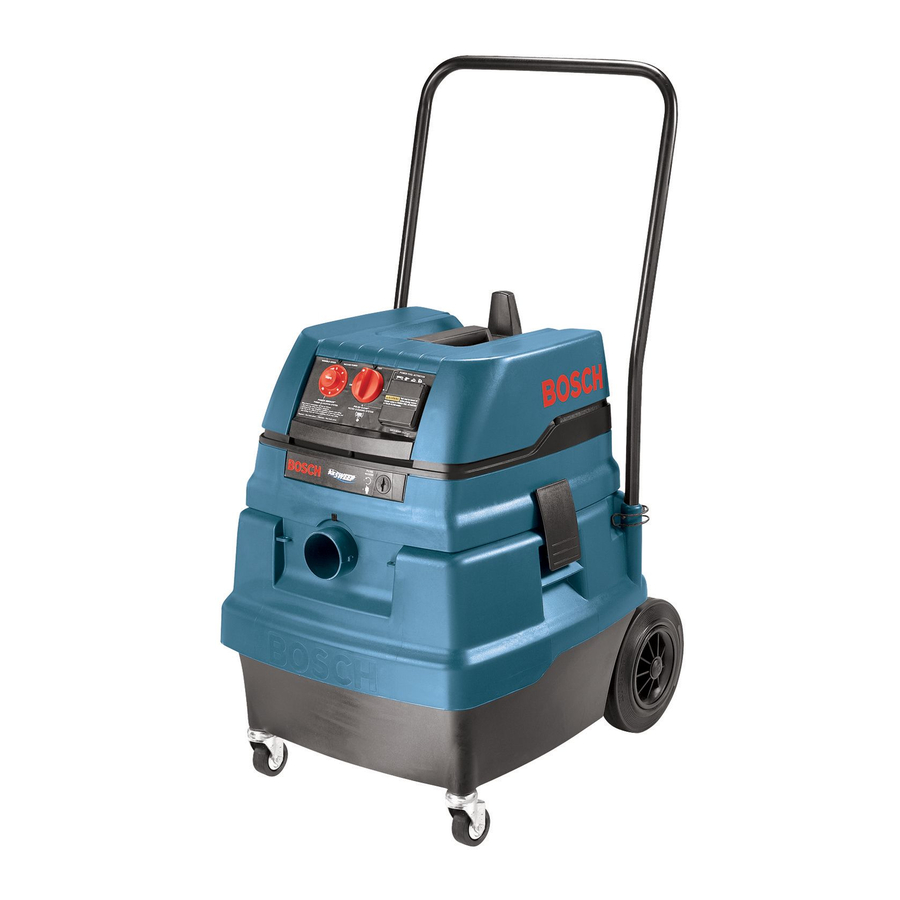Bosch 3931A - 13 Gallon Wet/Dry Vacuum Cleaner Manuel d'utilisation et de sécurité - Page 3
Parcourez en ligne ou téléchargez le pdf Manuel d'utilisation et de sécurité pour {nom_de_la_catégorie} Bosch 3931A - 13 Gallon Wet/Dry Vacuum Cleaner. Bosch 3931A - 13 Gallon Wet/Dry Vacuum Cleaner 41 pages. Robert bosch tool corp. operating/safety instructions portable vacuum cleaner 3931a

BM 1609929K45 08-06
gasoline or other fuels, lighter fluid,
varnish, polyurethane coatings, cleaners,
oil-based paints, natural gas, hydrogen,
coal dust, magnesium dust, grain dust, or
gun powder. Electric motors create sparks
which may ignite the dust or fumes.
Dress properly. Do not wear loose
clothing or jewelry. Contain long hair.
Keep your hair, clothing, and gloves away
from moving parts. Loose clothes, jewelry,
or long hair can be caught in moving parts,
hose, and suction nozzles. Keep handles
dry, clean and free from oil and grease.
Do not hold the hose against any body
parts during operation.
Vacuum Care
Do not use vacuum if switch does not
turn it ON or OFF. Any vacuum that cannot
be controlled with the switch is dangerous
and must be repaired.
Disconnect the plug from the power
source before making any adjustments,
changing accessories, or storing the
vacuum. Such preventive safety measures
reduce the risk of starting the vacuum
accidentally.
When using the Power
!
WARNING
Broker™
combination of the tool and vacuum
current draw must not exceed the rating
of the branch circuit the vacuum is
plugged into. Exceeding the branch circuit
rating could cause the vacuum and branch
circuitry to overheat, presenting a risk of fire.
Do not vacuum dust when liquid/fluid is
contained in the vacuum tank. Do not
vacuum liquids/fluids when dust is in the
tank. In either case empty the tank and/or
remove dust bag before use so that dust
does not cake and harden inside the tank.
Dry filters completely after wet vacuuming
or use a second dry filter set for dust
vacuuming. Damp or wet filters will cake
with dust or develop mold or mildew.
Store idle vacuum out of reach of children
and other untrained persons. Vacuums are
dangerous in the hands of untrained users.
Maintain vacuum with care. Properly
maintain
vacuum
8/14/06
11:42 AM
Vacuum Cleaner Safety Rules
feature,
the
to
keep
hose
Page 3
Use safety equipment. Always wear eye
and hearing protection. Dust mask, non-
skid safety shoes, hard hat, or hearing
protection must be used for appropriate
conditions.
This
!
WARNING
chemicals, including lead,
known to the State of California to cause
cancer, and birth defects or other
reproductive harm. Wash hands after
handling.
Not suitable to vacuum hazardous or
toxic substances or dusts e.g. asbestos.
The filters will not be able to capture all
particles and may exhaust them back into
the environment.
unobstructed. Do not put any object into
openings. Do not use with any opening
blocked; keep free of dust, lint, hair and
anything that may reduce air flow. Any
alteration or modification is a misuse and
may result in a dangerous condition.
Check for misalignment or binding of
moving parts, breakage of parts, and any
other condition that may affect the
vacuums operation. If damaged, have the
vacuum serviced before using. Poorly
maintained vacuums cause many accidents.
Develop a periodic maintenance schedule for
your vacuum.
Use
only
accessories
recommended by the manufacturer for
your model. Accessories that may be
suitable for one vacuum may become
hazardous when used on another vacuum.
Service
Only qualified repair personnel must
perform vacuum service. Service or
maintenance performed by unqualified
personnel could result in a risk of injury. For
example: internal wires may be misplaced or
pinched.
When servicing a vacuum, use only
identical replacement parts. Follow
instructions in the Maintenance section of
this manual. Use of unauthorized parts or
failure to follow the Maintenance Instructions
may create a risk of electric shock or injury.
Certain cleaning agents such as gasoline,
carbon tetrachloride, ammonia, etc. may
damage plastic parts.
-3-
product
contains
that
are
